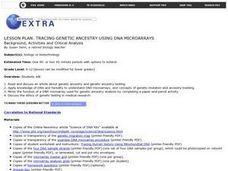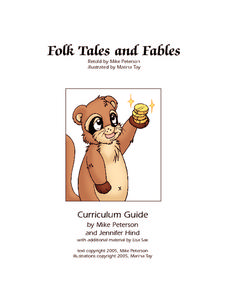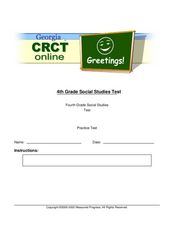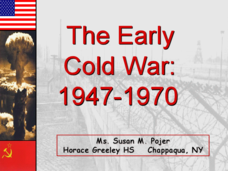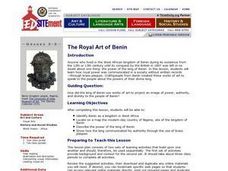National Endowment for the Humanities
James Madison: Madison Was There
Madison was there! Scholars go on a journey to discover the person behind the founding father label as they explore James Madison's role in the formation of the United States government. The culmination is a writing assignment and...
Curated OER
Tracing Genetic Ancestry Using DNA Microarrays
High school learners read and discuss an article about genetic ancestry and genetic ancestry testing. They complete a paper and pencil activity that mimics the function of a DNA microarray and consider the ethics of genetic testing in...
Curated OER
Reasons for Settling the New World
After studying the reasons settlers entered the New World, primary learners try to persuade others to enter this new land. Class members present their arguments in a variety of ways including posters, writings, and charts. Richly...
Curated OER
Nationalism in North Africa and the Middle East
Africa and the Middle East are the focus of this Social Studies PowerPoint. After viewing many slides that are packed with historical facts, viewers answer questions such as, "How was the struggle for independence in Algeria different...
PBS
Journalism in War Time: What Does the Public Need to Know?
A viewing of the documentary War Feels Like War, launches an exploration of the importance of accurate and comprehensive war reporting. Groups investigate various news agencies and assess the factors that influence their stories. A...
Weekly Story Book
Folk Tales and Fables
Pages and pages of engaging activities, worksheets, and writing projects on teaching folktales and fables await you! You don't want to miss this incredible resource that not only includes a wide range of topics and graphic organizers,...
Curated OER
Book: Crossing the Seas
As learners read each chapter of Eric Schwartz's Crossing the Seas, they analyze the actions of United States in Venezuela, Hawaii, Cuba, the Philippines, Puerto Rico, and the intent of the Monroe Doctrine. They then compare American...
Teach-nology
Author’s Purpose: Inform
Why does an author write an informative article? Learners examine passages of a short reading on Spain and determine what the author wanted to inform the reader about.
Curated OER
A Lesson To Accompany "The First Bank of the United States: A Chapter in the History of Central Banking"
Here is an interesting topic. Learners examine the economics that led to the founding of the First Bank of America. They participate in a reader's theater experience depicting the debate between Alexander Hamilton and Thomas Jefferson...
Curated OER
Europe
In order to review language skills, students in both upper elementary and higher grades can benefit from this activity providing an exploration of information related to Europe. This 12 question activity provides a reading passage,...
Curated OER
4th Grade Social Studies Quiz
In this social studies worksheet, 4th graders complete multiple choice questions about government, wars, natural resources, and more. Students complete 30 questions.
Curated OER
The Revolutions of 1848
1848 was a hot year for Europe, which endured political tumult and upheaval after years of tension buildup. This presentation details the circumstances surrounding revolutions in France, Austria-Hungary, Romania, Italy, Prussia, and...
Curated OER
Antebellum Revivalism and Reform
A gold mine for American history teachers, this presentation cascades through the middle of the 19th century with the central themes of moral and social reform. Between the blossoming Mormon church, the tightening of the Temperance...
Curated OER
The Early Cold War: 1947-1970
With a combination of images, maps, and valuable information, this presentation is a strong resource for a history class that is coming out of a WWII unit and into a Cold War unit. Some points are outlined for students, while others are...
Curated OER
Europe Discovers the Riches of India
Interpreting text is vital. Middle schoolers read a 1 page passage describing why Europe was so interested in colonizing India. After reading, they answer 8 comprehension questions.
National Endowment for the Humanities
Lesson 1: The United States Confronts Great Britain, 1793–1796
After the Revolutionary War, the success of the United States was far from guaranteed. Foreign powers coveted the new land, and Great Britain challenged American sovereignty. Learners consider the challenges facing the new nation using...
K12 Reader
Broken Promises
This comprehension worksheet asks readers to respond to a series of questions based on an article about the treatment of native peoples.
Scholastic
Groundhog Day
A simple activity for a simple, but special, holiday. Young learners read a brief history of Groundhog Day, practice reading aloud, and then discuss how shadows are formed.
ProCon
Drinking Age
Eighteen is the age of adulthood in the United States, but 21 is the legal drinking age. Pupils use the provided website to determine whether the age to legally purchase and consume alcohol should be lowered. They weigh the pros and...
Curated OER
Measures To Combat Mad Cow Disease
Students read an article at CNNfyi.com about Mad Cow disease. They identify and explain bovine spongiform encephalopathy and Creutzfeldt-Jakob disease. They formulate ways to combat mad cow disease.
Curated OER
Poetry of The Great War: 'From Darkness to Light'?
Young scholars examine World War I poetry for historical context, poetic devices, and participate in a class discussion. They write an analysis of the poetry's form and its content.
Curated OER
Scarcity and Choice: Mercantilism - the relationships between England, Africa, and the Americas
High schoolers trace the meaning and importance of mercantilism; past and present.
Curated OER
The Royal Art of Benin
Students investigate how the king of Benin used brass plaques to project an image of power to the people of Benin. They locate Benin on a map, explore various websites, and create a paper wall plaque that conveys symbols of power.
Curated OER
The Mathematician And The Archaeologist
Students decorate clay pots and destroy them in order to learn the techniques of modern-day archaeologists and practice mathematical measurements. This is an exciting lesson suitable for Social Studies, Math, Science, or Art classroom.
Other popular searches
- European Countries Geography
- Western European Countries
- Map of European Countries
- Eastern European Countries
- 15 European Countries
- Names of European Countries
- European Countries Research
- Flags of European Countries
- Energy in European Countries
- European Countries Development



